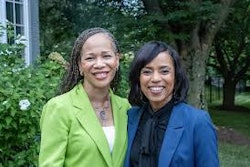Fostering a deeper understanding of diversity, equity, and inclusion initiatives at U.S. colleges and universities, was the focus of a webinar sponsored by the Congressional Black Caucus Foundation.
The conversation, titled, "Championing Inclusion: The Impact of DEI Programs in Higher Education,” provided valuable insights on navigating challenges and championing inclusion in the evolving landscape of academia.
U.S. Congressman and CBC Chair Steven Horsford opened the webinar on Wednesday evening, by reminding participants about the value of DEI efforts amidst a challenging political landscape.
“Now more than ever, it is critical to protect and champion these efforts. These programs are not just about diversity for diversity’s sake, they are about equity, justice and building an educational environment where all voices are valued, all experiences are respected and everyone has a fair shot at success,” said Horsford, who represents Nevada in Congress. “Unfortunately, we find ourselves in a moment where our collective efforts are under attack. Misconceptions and misinformation about these initiatives have fueled a misleading narrative,” he added.
Panelists included Drs. Shaun Harper, Provost Professor of Education, Public Policy and Business at the University of Southern California; Khalil Muhammad, Professor of History, Race and Public Policy at Harvard Kennedy School, and Kimberly Griffin, Dean and Professor of Education at the University of Maryland.
“Diversity, equity and inclusion policies and programs aim to right the past and present wrongs of America. They're not anti-American. As a matter of fact, they attempt to help America enact the ideals that we have long espoused,” said Harper. “Many of the DEI obstructionists very wrongly accuse those of us who do the work, as being anti-American and people who hate America. No, we love America enough to try to make it the most diverse, equitable and inclusive version of itself in the context of higher education.”
Harper also offered commentary on the ways DEI efforts not only aim to help students of color, but also those from other protected classes.
“I want to just dispel that whole myth that it's just about wokeness,” said Harper. “It's actually about attempting to ensure that the next generation of Congress persons, governors and other elected officials, CEOs, schoolteachers, university professors and everybody else in every industry in our economy, is prepared to lead in a way that is equitable and inclusive.”
During the discussion, the impact of recent legislative bills targeting DEI initiatives in higher education was also discussed. Since 2021, over 100 bills have been proposed in 44 states, with 22 states successfully enacting them. The laws have led to the defunding and dismantling of DEI programs, affecting student support services and curricular commitments. Specific impacts include reduced mentoring, tutoring, and social programming, as well as the elimination of disciplines like sociology and ethnic studies.
“There are implications for what people will have the ability to learn,” said Griffin. “So, I think about real people who have lost their jobs and who are kind of put out there for doing work that they believe in, that they think is going to promote justice, or work that they think is making the environment more equitable, then names and faces get attached to these initiatives that put real individuals at risk. And that's something that worries me and concerns me deeply,” she added.
She explained that the contentious public discourse around topics like critical race theory, "woke" ideologies, and book bans have created a chilling effect, leading many educators to self-censor. This has led to faculty and teachers at all levels, from higher education to K-12, becoming increasingly hesitant about what they teach, research, or even how they approach admissions or financial aid, fearing potential backlash.
Those fears are likely to grow under a second Trump presidency.
“We already know what to expect. They wrote a blueprint, a playbook, and it's already been enacted in 22 states,” said Muhammad, who expressed concern about federal protections for certain students and programs that ensure access to meals and funding through Title I and Title VII.
Muhammad added that he is also worried about proposed changes to the accreditation process, with efforts to shift control to state legislative bodies.
“Accreditation, as all of us know, is one mechanism through which schools are basically stress tested for how well they're doing to produce good outcomes for their students,” he said. “Are they using appropriate resources, are they addressing all of their student needs, which, again, for most of higher education, wasn't called DEI, but certainly DEI is complementary to those commitments.”
He said that the Trump administration plans to target higher education institutions financially, including taxing the nonprofit status of colleges and universities and penalizing institutions with large endowments based on allegations of discrimination. Those actions could strip schools of federal grant funding if their accreditation is removed under such a process.
In terms of solutions and strategies, Griffin emphasized the need for a more unified and strategic approach to counter opposition to DEI efforts in education. She pointed out that opponents of DEI have been highly coordinated, well-funded, and effective in disseminating clear, simple, and misleading messages that resonate with their audience. In contrast, she believes supporters of equity in education have struggled to present a more straightforward narrative about the value and importance of their work.
“I think there is room for us to work together in a more coordinated way, and for institutions not to think of themselves and their own interests,” she said. “We all have our own interests. We all have our own context. But to what extent can we come together and speak with a more unified voice to our audience?” she asked.
Looking ahead, Griffin said that she hopes more Americans will recognize how DEI principles connect to their daily lives and understand the critical role voting also plays in safeguarding those protections.
“There are too many everyday Americans who feel like none of this is relevant to them,” she said. “We need to do better in terms of reaching these folks so that they understand the importance of their vote and what they're voting for and the larger context of the conversations that we are having. There’s so much at stake.”


















